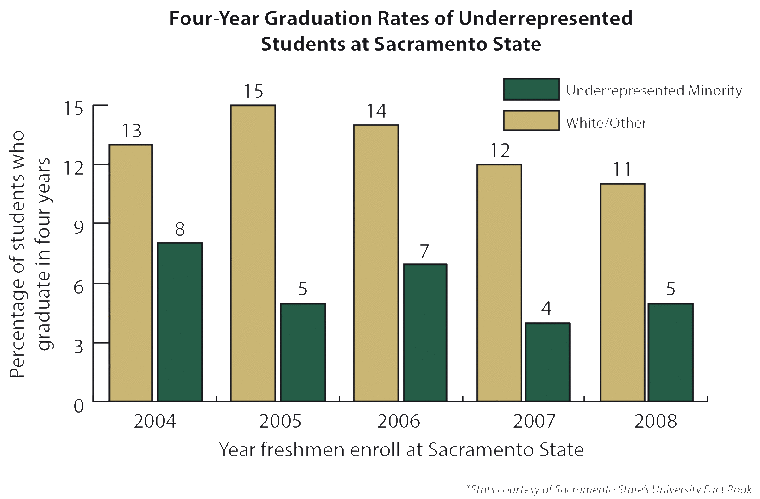Program helps minorities get into graduate school
October 30, 2013
Social work major Jazzmine Parker, 23, wants to apply to graduate school to become a medical social worker and professor.
She joined the McNair Scholar Program at Sacramento State to help her pursue her goal.
“[McNair] opened my eyes in how to be competitive when applying for graduate school,” Parker said.
The program aims to prepare underrepresented and socioeconomically disadvantaged students entering graduate studies and ensures they have the opportunity to attend graduate school and improve the low enrollment of minorities.
“The program is here to increase diversity in graduate studies,” said Erika Mendoza, administrative coordinator for the McNair Scholar Program. “Historically, students from underrepresented backgrounds are also the ones with the lowest percentage attaining graduate degrees.”
The program was designed for students who show potential in education at the doctoral level but may face inaccessibility due to low income, an underrepresented background or is a first generation college student.
Former faculty mentor Michele Foss-Snowden said getting into and through graduate school is a process that can be much easier if a student has parents who went to graduate school.
“Typically, these shortcuts and secrets are passed down through families,” Foss-Snowden said. “With students who are traditionally underrepresented in graduate education, they might be the first to even consider graduate school, so they don’t have a family member to pass down the tricks and tips.”
Mendoza said the program provides the tools needed for underrepresented students to attend graduate school and be successful.
The program trains students in research with faculty mentors, prepares them for the graduate admissions test, offers application fee waivers, pays for travel to national conferences and offers a stipend during the summer.
Students are paired with faculty mentors who assist them with developing an original piece of intensive research focusing on the field the student wants to pursue in graduate school.
After the student’s research is completed, it becomes published and students have the opportunity to present it at national McNair conferences.
“I think engaging students in research is very important,” said Kim Roberts, McNair former faculty mentor and current psychology professor. “In addition, I am a strong advocate for the McNair program.”
Roberts said she has mentored four students, and three of them are now in graduate school.
The McNair Scholar Program was named after Ronald Ervin McNair, the second African-American to fly in space, and has been at Sac State since 1999.
McNair received his Ph.D in physics and was nationally known for his work in laser physics, but died in a space shuttle explosion on Jan. 28, 1986.
Political science major Jose Zacarias, 23, is a second-year scholar and first generation college student, identifying himself as Mexican.
“I had no understanding of what graduate school was,” Zacarias said. “No one in my family has gone so far in school. Not even to a bachelor’s.”
According to the United States Census Bureau, there are 53 million Latinos in the country but only 1.2 million have an advanced degree.
“Diversity in graduate schools is important because we have students who are interested in graduate school but do not know the mechanics,” said David Leon, past faculty mentor and retired professor.
Biochemistry major Ashley Jackson, 24, is another second-year student.
She identifies herself as African- American and said she believes many African-Americans do not look up to the right role models, idealizing sport players or celebrities instead.
“If I were to ask who Ronald E. McNair is, nobody would know,” Jackson said.
Jackson said in order for more African- American students to continue school after undergraduate studies, they need to see more people like them involved in fields they are interested in.
At Sac State, there are 1,382 professors and 329 could be considered minorities.
“Part of the program’s mission is that those students who go through McNair will go on and complete their Ph.D. and become professors, Other students see role models in those professors,” Mendoza said. “Students would see themselves. It might seem unattainable in the beginning, but seeing someone who looks like you influences you.”
























































































































